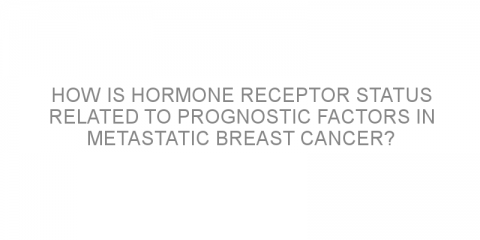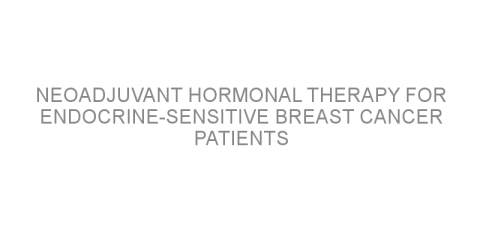In a nutshell This paper studies a lymphedema risk reduction program entitled "The Optimal Lymph Flow". Some background Many breast cancer survivors are at risk of developing lymphedema (build up of fluid that causes swelling in the affected limb) after surgery. A higher body mass index (BMI) also increases the risk...
Read MoreConfined or spread disease-Extends into the skin or chest wall Posts on Medivizor
How is hormone receptor status related to prognostic factors in metastatic breast cancer?
In a nutshell This paper evaluates whether prognostic factors(factors that predict outcome of disease) have different effect depending on hormone receptor status in metastatic breast cancer Some background Metastatic breast cancer (cancer that has spread) is generally incurable with a low survival rate. Several prognostic factors have been...
Read MorePregnancy after breast cancer
In a nutshell This study investigated the effects of pregnancy following breast cancer diagnosis and treatment. Some background Nowadays, most breast cancer patients enjoy high survival rates and years of disease free quality of life. While the effects of breast cancer on fertility and pregnancy outcomes have been well researched, the effects of...
Read MoreChemotherapy-induced peripheral neuropathy
In a nutshell This review explored recent evidence regarding chemotherapy-induced peripheral neuropathy following treatment with different types of chemotherapeutic agents. Some background Chemotherapy, often used in the treatment of cancer, is well-known for its short-term toxic side-effects such as nausea or hair loss. However, symptoms of...
Read MoreMammaPrint genetic testing for prediction of long-term breast cancer outcomes
In a nutshell This study investigated the accuracy of the 70-gene signature (MammaPrint) genomic profiling test in predicting metastasis and long-term outcomes among breast cancer patients. Some background Gene-expression signature tests, such as MammaPrint, were developed in order to assess the biological action, and therefore the aggressiveness,...
Read MoreDoes the number of lymph nodes removed have prognostic value?
In a nutshell This study examined whether the number of lymph nodes removed in breast cancer patients predicts survival more accurately than standard staging. Some background Lymph nodes are small, bean-shaped organs that act as filters along the lymph fluid channels. As lymph fluid leaves the breast and eventually goes back into the...
Read MoreDoes pregnancy affect survival?
Does pregnancy affect survival? This study evaluated the effect of pregnancy on the survival of women with BRCA associated breast cancer. Hereditary breast cancer (associated with a mutation in either the BRCA1 or BRCA2 gene) typically presents itself in younger women. Consequently, the onset of breast cancer often overlaps with pregnancy....
Read MoreAdherence to trastuzumab therapy
In a nutshell This study evaluated the use, effects and adherence of trastuzumab (herceptin) as treatment for patients with breast cancer. Some background Trastuzumab is often prescribed as adjuvant (additional) therapy for human epidermal growth factor receptor-2 positive (HER2+) breast cancer. HER2 is a protein found on the surface of some...
Read MorePathologic complete response to neoadjuvant therapy predicts prognosis in HER2-positive breast cancer
In a nutshell This study assessed the impact of pathologic complete response (pCR) to neoadjuvant chemotherapy and trastuzumab (herceptin) on survival of HER2-positive breast cancer patients. Some background Neoadjuvant therapy refers to treatments given before surgery in order to shrink the tumor and allow for complete surgical removal of the...
Read MoreNeoadjuvant hormonal therapy for endocrine-sensitive breast cancer patients
In a nutshell This review assessed the effects of neoadjuvant hormonal therapy (NHT) in patients with endocrine-sensitive breast cancer. Some background Endocrine-sensitive breast cancer (also known as hormone receptor-positive breast cancer) refers to breast cancer cells which contain hormone receptors. These receptors (complexes on the...
Read MoreTamoxifen reduces the risk of contralateral breast cancer in women with BRCA1 or BRCA2
In a nutshell This study examined whether tamoxifen (nolvadex) can reduce the risk of contralateral breast cancer in women diagnosed with breast cancer and the BRCA1 or BRCA2 genetic mutation. Some background The BRCA1 and BRCA2 genetic mutations are associated with a high risk of developing breast cancer. While prophylactic mastectomies (a...
Read MoreThe benefits of beta-blocker treatment in triple negative breast cancer patients
In a nutshell This study investigated the potential benefit of beta blocker treatment in triple negative breast cancer patients. In this study, patients already receiving long term treatment with beta blockers before the diagnosis of cancer were investigated to examine the effect on cancer outcome. Some background Beta blockers are a class of...
Read More











